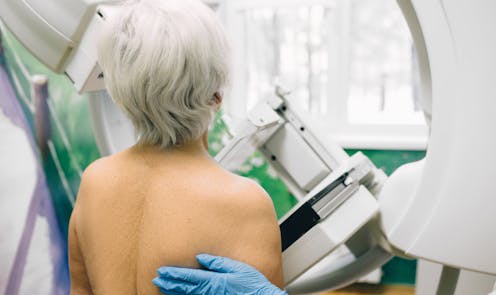COVID vaccine may lead to a harmless lump in your armpit, so women advised to delay mammograms for 6 weeks
- Written by Rik Thompson, Professor of Breast Cancer Research, Institute of Health and Biomedical Innovation and School of Biomedical Sciences,, Queensland University of Technology

Australian women are being asked to think about the timing of breast cancer screening as they prepare to receive their COVID vaccine.
This is in light of US evidence that a normal consequence of COVID vaccination, temporary swelling of the lymph nodes in the armpit, may interfere with how doctors interpret mammograms.
So women have been advised to either have a mammogram first, or delay it until six weeks after vaccination, to avoid any confusion.
This advice is particularly relevant now we are preparing to vaccinate the over-50s, the key target age for routine breast cancer screening under Australia’s BreastScreen program.
What’s all this about lumps?
When people have vaccines in their upper arm, it’s normal for the lymph nodes in the armpit on that side of the body to be activated and swell. It’s your body preparing a protective immune response.
After their COVID shot, some people develop more severe swelling in the armpit than others. While estimates vary, only about one in ten people vaccinated can feel a lump there, and it’s not always painful.
It’s important to stress these lumps are not breast cancer, and are not harmful. They also disappear within one or two weeks of vaccination.
Read more: Explainer: how does the immune system work?
However, a swollen lymph node can affect imaging such as breast cancer screening by mammography or ultrasound. This is because it looks like breast cancer that has spread (metastasised) from the breast to the lymph node. This can have important consequences.
An enlarged lymph node may cause a woman to have further testing to confirm or rule out breast cancer. This can lead to further imaging, invasive procedures such as biopsies, and patient anxiety.
So it’s important to note this potential impact of COVID vaccination on mammography, ahead of Australia ramping up its vaccine rollout, especially in the over-50s.
So what’s behind the new advice?
Reports of COVID vaccine-related swollen lymph nodes emerged from the United States, where almost 90 million people have been vaccinated with the Pfizer or Moderna vaccines.
This led to swollen lymph nodes showing up on breast imaging, including mammography and ultrasound.
According to the Royal Australian and New Zealand College of Radiologists, this type of swelling has not been reported with the AstraZeneca vaccine. This is the vaccine earmarked for the over-50s in Australia from May.
However, as activating the immune system is how all vaccines work, we’ve seen similar swelling after vaccines other than COVID. So it’s likely we’ll also see it with other COVID vaccines. However, we have yet to see published data from the United Kingdom and other countries that have more experience administering the AstraZeneca vaccine to confirm this.
Nevertheless, the college has recommended women have their mammogram before their COVID vaccine, or six weeks after vaccination, without specifying any particular COVID vaccine.
Others have proposed a more pragmatic approach of monitoring any suspected case of a swollen lymph node in the armpit on the side of the injection, and only investigating further if the swelling doesn’t go down after six weeks.
Read more: Women should be told about their breast density when they have a mammogram
Why is this so important?
It’s essential for both COVID vaccination and mammography screening of women without symptoms to continue.
While it is important screening identifies women with breast cancer, it is also important not to over-investigate otherwise healthy women. So it makes sense to delay the screening of otherwise healthy non-symptomatic women for a short time, and to not over-investigate women who do not have cancer.
It’s also important for women with breast cancer symptoms to seek medical advice immediately, and for the appropriate diagnostic imaging to take place.
However, in light of the recent advice, women should mention their COVID vaccination status to their health-care team — GP, radiographer and specialist doctor — so they can take this into account when interpreting imaging. That’s whether or not their mammograms are part of the breast cancer screening program.
Read more: What causes breast cancer in women? What we know, don't know and suspect
Authors: Rik Thompson, Professor of Breast Cancer Research, Institute of Health and Biomedical Innovation and School of Biomedical Sciences,, Queensland University of Technology





